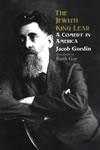The Jewish King Lear
A wealthy Russian Jew prepares to celebrate Purim with his three daughters. The eldest is married to an intelligent, orthodox student of religion. The middle daughter is married to a lively young Hassid. And the youngest (oy veh) is married to a nice bright graduate student who has no particular use for Jewish observance at all. As you can imagine, this leads to lively discussion around the table.
And when the old man announces that he's going to divide his business interests among the children and go live in Israel, his wife immediately exclaims: "King Lear!" It's not a translation or an adaptation: it's the whole postmodern twist, way back in 1892. We're in Lear, but the characters all know they're trapped in Lear, and they talk about it.
Jacob Gordin's Kenig Lir became a legend of the Yiddish theater. It was the signature role of Jacob Adler, the great actor (and father of Stella Adler, whose influence on American acting was profound). It was the wellspring of the realistic family drama that became the core of Broadway in the 20th century. The dialogue seems stilted, in part because the rhythms of Yiddish sound that way to this generation, in part because our great grandparents liked theater to be more theatrical than we do. Gay adds a wealth of supporting essays and readings, all fascinating in their recreation of a vibrant immigrant world.
